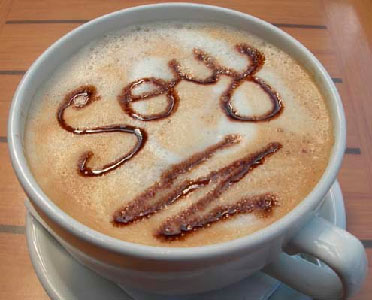Delivery truck drivers have told reporters that they’re not drinking cheap coffee anymore after finding out what was in the sacks of “coffee” they’d been driving from suburban Ho Chi Minh City to central Vietnam.
Those sacks smell of coffee but they contain no coffee.
They are roasted soy beans soaked in chemicals instead.
Many coffee producers and distributors in suburban HCMC have been busted by local authorities using soy beans or corn and life-threatening chemicals to make cheap counterfeit products favored by retail distributors.
A worker at coffee maker Thong Phat said his factory certainly smelled like coffee. “But I bet you couldn't’t find a single coffee bean in this so-called coffee factory,” he said.

In a 500 square-meter room covered in old rusty metal, soy beans were roasted black and soaked in a “black mixture” of unknown chemicals.
All the stuff was then spun and roasted in an oven until the chemicals absorbed into every bean.
After that, the chemical-soaked soy beans were put on a large tray made of iron sheets on the floor, tossed and dried.
A new batch of coffee-smelling soy beans came to life.
The factory, standing next to a black canal that smelled disgusting, produces 1.5 tons of fake coffee a day from hundreds of soy beans or corn sacks and chemicals muddled up on “an inky-black floor.”
Many distributors bought chemical-soaked soy beans from Thong Phat, grinding the beans themselves and selling their well-packed products to coffee shops in HCMC and neighboring provinces for VND60,000-120,000 per kilogram.
Thong Phat’s fake coffee is also delivered directly to the Mekong Delta region and central Vietnam by passenger cars from bus stations in the suburban districts of Tan Phu, Tan Binh and Binh Tan every week.
Le Minh Thong, Thong Phat’s owner, told officials that his factory has produced the fake coffee for two years. Many customers themselves provided ingredients for manufacturing that included soy beans, “coffee essence” and other chemicals, he said.
Authorities are investigating.
A 10-year veteran of the coffee-making business who wanted not to reveal his name told reporters there are five large-scale coffee makers, each of whom provides southern and central Vietnam market with roughly ten tons of “special coffee” in eye-catching packaging every day.
Their products also include chemical-soaked soy beans and corn or fake coffee powder.
“It is not difficult to differentiate between real and fake coffee in the market. Coffee is black; fake coffee contains chemicals and easily fades when we add ice while real coffee doesn’t,” news website VnExpress quoted Nguyen Van Toan, chairman of a co-operative in the central province of Dak Nong and owner of many coffee brands, as saying.
Coffee was first grown in Vietnam in the mid-19th century. It has been a popular drink in the country since the early 20th century.
Vietnam has surpassed Brazil to become the world’s largest coffee exporter. It shipped 14,325,000 bags abroad in the frirst six months of this year, 13.63 percent more than Brazil, the government reported August 14, citing the International Coffee Organization.
Toxic
“I dare not drink coffee outside anymore. It’s better to process coffee beans by myself!” said an official who inspected Thong Phat in mid-July.
Earlier, Tan Phu District’s inspectors in late June checked cooking safety issues at Thong Phat company but the company’s marks were “good”, which was different from the conclusion of “failing to meet requirements” issued by HCMC Department of Health.
The factory still does not have any food safety certificate or medical certificates for each worker. There are also no safety clothes for workers and no new and clean tools.
Another coffee producer, Xuan Hoanh, which was also detected making coffee with soy beans and chemicals in mid July, had received a certificate from the Ho Chi Minh City Health Department confirming that it had met government quality, hygiene and safety regulations and was licensed to distribute.
Experts said that additives used to turn soy beans into coffee-like beans, which include coffee flavorings, foam-making substance Sodium Lauryl Sulfate mainly used to make shampoo or dish-soap, industrial color powders and Carboxymethyl Cellulose (CMC), can contain impurities and heavy metals like mercury and lead, which may lead to cancers if used for a long time.
Doctor Tran Van Ky warned that the abuse of the antibiotic Chloramphenicol can poison human livers, bone marrow and kidneys, while chemical sugar Sodium Cyclamate, which is 50 times sweeter than normal sugar, can bring users cancers or Down syndrome.
But preferable
A veteran fake coffee producer in suburban HCMC, who wanted to be identified as T. only, used 15 types of chemicals for his “special coffee”. He bought them easily at Kim Bien Market in District 5.
T. said, “Real coffee beans should be sold at VND200,000 (US$9.6) per kilogram, so most customers would choose to have 70-80 percent of their coffee made from soy beans.”
His customers can choose products priced between VND120,000-150,000 per kilogram, depending on the amount of real coffee, but sometimes they can get nothing but soy beans with VND120,000 ($5.8), according to the fake coffee maker.
He sent his regular clients in HCMC and throughout southern Vietnam a ton of coffee-like soy beans every day. “That means my coffee production isn’t worse than any famous coffee brands’,” T said.
Ngo Tan Giac, owner of Thu Ha Coffee, was quoted by VnExpress as saying that some dealers add soy beans or corn to reduce caffeine in coffee so that it can meet the demands of many customers, who are not used to pure coffee.
“The thing is some customers actually prefer cheap and tasty coffee, which creates favorable conditions for fake coffee makers," he said. "My coffee in the Mekong Delta market cannot compete with fake coffee.” Source: Thanhniennews |













